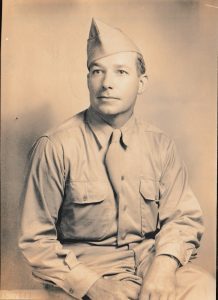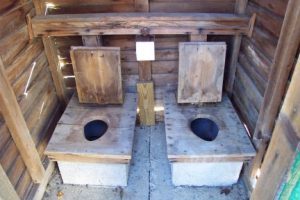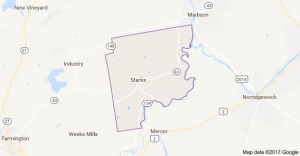Thanks to Mon Oncle
First: In the Shameless Commerce division, please put January 28 on your calendar for Local Writers at the Local Buzz café and wine bar in Cape Elizabeth, 4:00 to 5:00 PM. I will be reading from Solo Act and new work, along with Jeri Theriault, the talented South Portland poet. This monthly reading series is now in its sixth year. Founded in 2011 by poet Marcia F. Brown and essayist Penelope Schwartz, the series has featured over 130 area authors of fiction, nonfiction and poetry. It is now co-hosted by Brown and Portland poet Linda Aldrich. Hope to see you there!
In this reflective time of year and counting my blessings for being back in Maine, I got to thinking about how I wound up here the first time around. Unlike a native Mainer, my origin story in the state is a little more convoluted and rests squarely on the story of my uncle, Richard Clogston.
My namesake uncle was a bean farmer first, then a dairyman, in Starks, a not very large village to the left of Norridgewock and north of New Sharon. My mother’s brother, fourteen years older, he fought in World War II, earning a Purple Heart and a Bronze Star. I knew him better as mon oncle, living the charmed life up on the farm that I thought might suit me better than the suburbs of Boston.
My earliest summer memories are of riding the top of a truckload of beans to the cannery with my brother, bouncing green beans off the windshields of the cars behind us: no shirts, no shoes, no problems. We’d trail him into the barn to watch the milking, thrilled to learn new swear words when a cow’s tail switched him in the eye.
He always had two dogs, usually collies, with Scottish-sounding names: Mac and Bruce were the pair I remember most clearly. And he never, as far as I knew, had a girlfriend or a wife. I never heard more about that than my mother’s vague story about the girl who didn’t wait for him to come home from the war.
My brother and I loved being on the farm since we didn’t have to do any of the work: the dusty-hay and manure smells of the barn, the fact that mon oncle didn’t have to make his bed or do the dishes that piled up in the sink until he needed them. We even tolerated the nose-wrinkling, eye-watering two-holer out back. Ah, the romance.
When he came to visit us in Boston, I could tell all the closeness made him nervous—the traffic, the crowd of family, the fact that he had to go out on the porch to smoke his Winstons. And I know I picked up a sense of self-sufficiency from him, the idea that most of what you needed was work, the companionship of animals, a door to the outdoors. I was into my teens before I added a need for romantic companionship to my list of essentials. But I did, as we said then, know where he was coming from.
My brother came to his senses, went on to live and work in cities all over the country. I hopped all over the place too but always with an eye to being near places where I could lie down in a field and look at the sky, tramp around the woods, feel pine duff and dirt under my feet more often than asphalt. And I blame all that on mon oncle and the farm, where I learned to need the quiet and what I found outdoors.
Would he have been such a model for me if he hadn’t been in Maine? I doubt it. My family and friends elsewhere in New England worked for the gas company, were engineers, carpenters, construction workers, heavy equipment operators, and mechanics, kinds of work I was pretty sure I had no talent for. In the sixties and seventies, at least, I could see myself working on the land, growing things, living in the woods, though I certainly know now I was indulging a romantic notion of that work.
I never lost my taste for woods and pastures, though in my teens, my family started vacationing in the lakes of southern New Hampshire. There was more society there and less sense of living in nature, the woods thinned and scrawny from decades of pressure, at least where they hadn’t been clear-cut to build houses. But I would often hike up into the woods behind the lake and try to get someplace where I couldn’t see or hear the signs of human life.
Now, of course, I live in the city but it is a comfort to know that places like Starks are only a couple hours away. Maine is full of towns where you’ll rarely see tourists but they are in many important ways the essence of the state.
Starks, New Sharon, and towns like them informed what I hope are my best values: love of work, love of land, responsibility to my neighbors and my community. I hope they inform my writing as well. I might never have thought much about any of that without mon oncle and that would have been my loss as much as anyone else’s.



